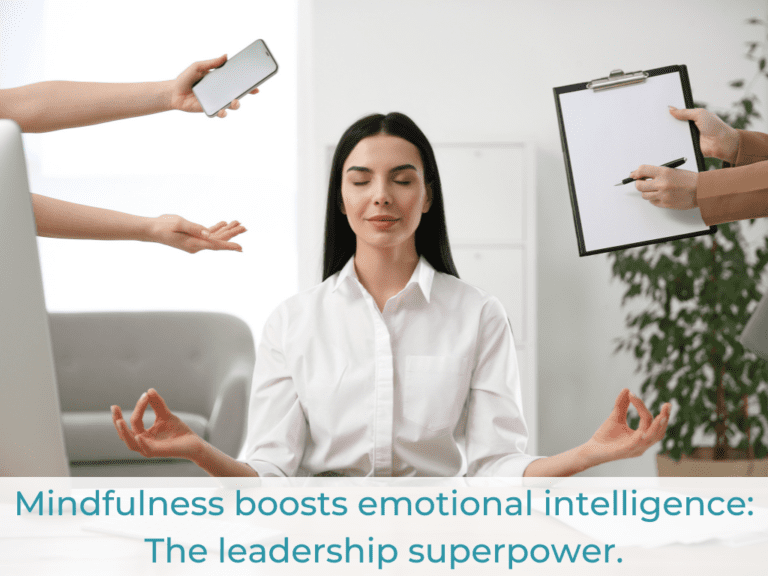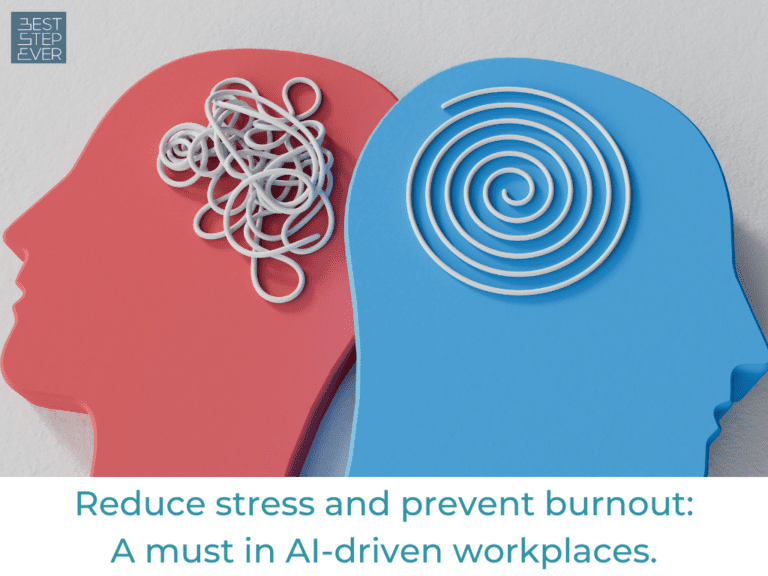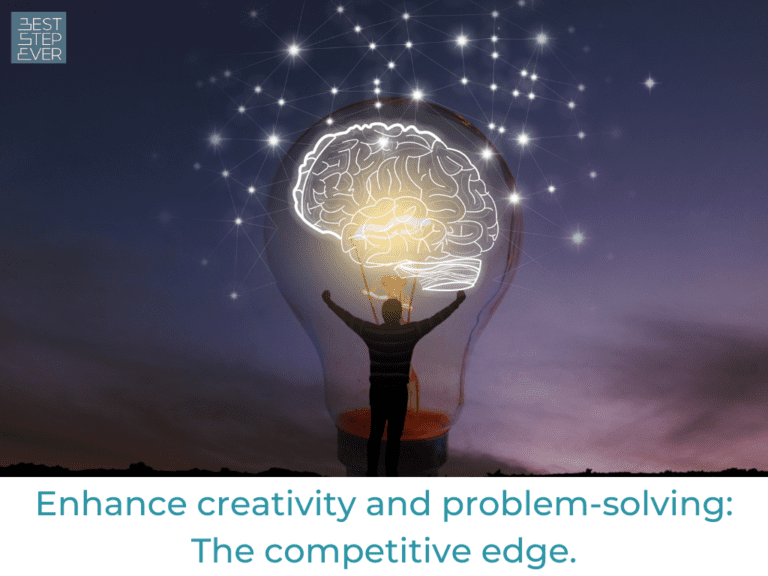The surprising link between mindfulness and leadership success.
In a world dominated by AI and rapid corporate shifts, leadership is more challenging—and more critical—than ever. But what if the key to thriving in this complex landscape isn't about learning more tech skills or adopting the latest management fad? Instead, it's about something much simpler and more profound: mindfulness.
Mindfulness, often associated with meditation and wellness, has a surprising application in the corporate world. It’s more than just a tool for personal well-being; it's a strategy for leadership success. In the age of AI and unprecedented complexity, leaders are finding that the ability to stay present and focused is essential for navigating challenges, inspiring teams, and making sound decisions.
As businesses continue to integrate AI into their operations, leaders are under immense pressure to adapt quickly. The complexity of these changes can be overwhelming, leading to stress, burnout, and poor decision-making. Mindfulness offers a counterbalance, helping leaders maintain their composure and clarity, even in the face of constant change. Let’s explore how mindfulness can be your secret weapon in becoming a more effective leader.

Emotional Intelligence (EQ) is increasingly recognized as a critical component of effective leadership. Unlike Intellectual Intelligence (IQ), which measures cognitive abilities, EQ is all about understanding and managing your own emotions, as well as recognizing and influencing the emotions of others. In high-pressure environments, a leader's ability to stay calm, empathetic, and connected can make all the difference. Mindfulness is a key tool for enhancing these skills.
When we practice mindfulness, you’re training your brain to become more aware of the present moment without judgment. This heightened awareness allows leaders to pause before reacting to stressful situations, which is essential for managing emotions effectively. For instance, rather than responding with frustration or anger, a mindful leader can approach challenges with a clear, calm mind, leading to better outcomes.
Moreover, mindfulness improves leaders’ ability to empathize with their team members. This doesn’t just improve relationships; it also boosts morale and productivity. A leader who is emotionally attuned to their team can better address their needs and concerns, leading to a more engaged and motivated workforce. An article titled ‘The mindful leader: A review of leadership qualities derived from mindfulness meditation’ published by Doornich, J. B., & Lynch, H. M. (2024) helps to make sense of why mindfulness is must-have skill for today’s leaders.

In today’s corporate world, stress is almost inevitable. With AI and other technologies accelerating the pace of work, leaders are often expected to make decisions faster and manage more information than ever before. This constant pressure can easily lead to burnout, which not only affects the leader but also the entire organization. Mindfulness offers a practical solution to this widespread issue.
Mindfulness practices, such as meditation and deep-breathing exercises, help reduce stress by calming the nervous system. These practices encourage a state of relaxation that counteracts the body’s stress response, lowering cortisol levels and reducing feelings of anxiety. This not only benefits the leader’s health but also improves their ability to think clearly and make sound decisions under pressure.
Furthermore, mindful leaders are better equipped to create a healthy work environment for their teams. By modelling calmness and resilience, they can inspire similar behaviours in their employees, reducing overall stress levels within the organization. Leaders who regularly practice mindfulness generally show lower stress levels and are less likely to experience burnout. They also create more supportive and sustainable workplaces, where employees can thrive without sacrificing their well-being. Read how mindfulness can help to escape the burnout trap by Shannon A Swales.

In an era where AI can handle data analysis and routine tasks, human creativity remains one of the most valuable assets in the corporate world. However, creativity doesn’t always come easily, especially when leaders are bogged down by stress, distractions, and information overload. This is where mindfulness can make a significant impact, serving as a catalyst for innovation and creative problem-solving.
Mindfulness encourages a state of open, relaxed awareness, which is ideal for generating new ideas and solutions. When the mind is calm and focused, it’s better able to connect disparate pieces of information, leading to those "aha" moments that drive innovation. For leaders, this means being able to think outside the box and approach challenges from fresh perspectives, a critical skill in today’s rapidly changing business environment.
Moreover, mindfulness helps leaders stay adaptable in the face of uncertainty. In a world where the only constant is change, the ability to pivot and innovate quickly is crucial. Mindfulness can significantly enhance creative thinking and cognitive flexibility. This makes mindfulness not just a tool for personal well-being, but a strategic advantage for leaders looking to stay ahead of the competition.
LinkedIn shares an interesting article on how mindfulness can impact creativity and innovation.

Leadership isn’t just about individual performance; it’s also about how well you can inspire and guide your team. Mindful leaders are often more effective in fostering positive team dynamics, which are essential for high performance and job satisfaction. This is because mindfulness enhances communication, empathy, and conflict resolution skills—key ingredients for a cohesive and productive team.
When leaders practice mindfulness, they become more attuned to the needs and emotions of their team members. This heightened awareness allows them to address issues before they escalate, fostering a more supportive and harmonious work environment. Employees feel heard and valued, which boosts morale and encourages collaboration. In contrast, leaders who lack mindfulness may overlook these subtleties, leading to misunderstandings and tension within the team.
Furthermore, mindful leaders are better equipped to navigate difficult conversations and resolve conflicts in a constructive manner. By staying calm and centered, they can approach disagreements with empathy and clarity, leading to solutions that satisfy all parties involved. According to a study published in the Journal of Business Ethics, mindfulness in leadership is directly linked to more ethical decision-making and stronger team cohesion. In today’s competitive business landscape, these qualities can make all the difference between a team that merely functions and one that truly excels.
Conclusion
The future of leadership is mindful.
As AI continues to reshape the corporate world, the leaders who will thrive are those who embrace mindfulness. This simple yet powerful practice enhances emotional intelligence, reduces stress, boosts creativity, and strengthens teams—making it indispensable for modern leadership.
Incorporating mindfulness into your leadership approach is not just about personal well-being; it’s about becoming a more effective, compassionate, and innovative leader. The benefits extend beyond the individual to the entire organization, creating a ripple effect that leads to greater success and sustainability. As we move further into the AI era, the ability to lead with a calm mind and an open heart will become increasingly vital.


